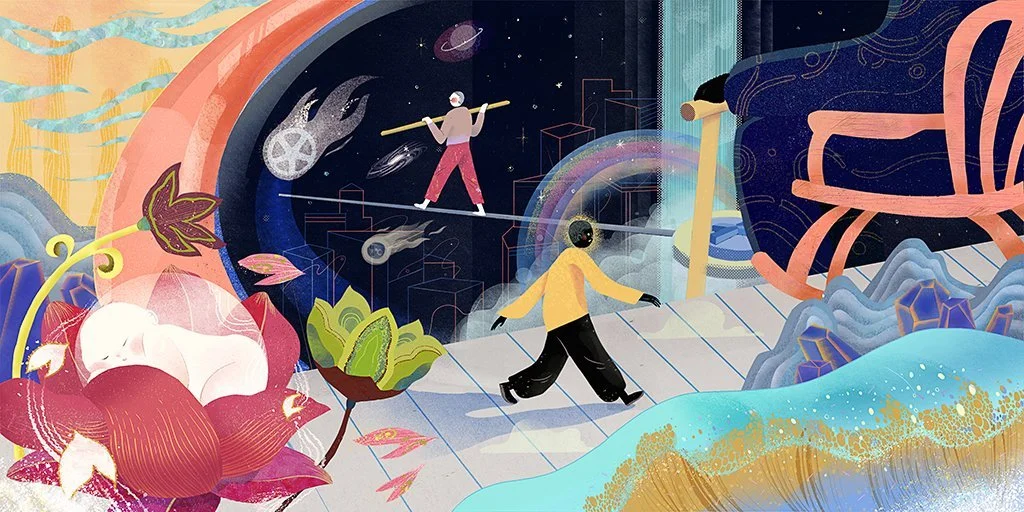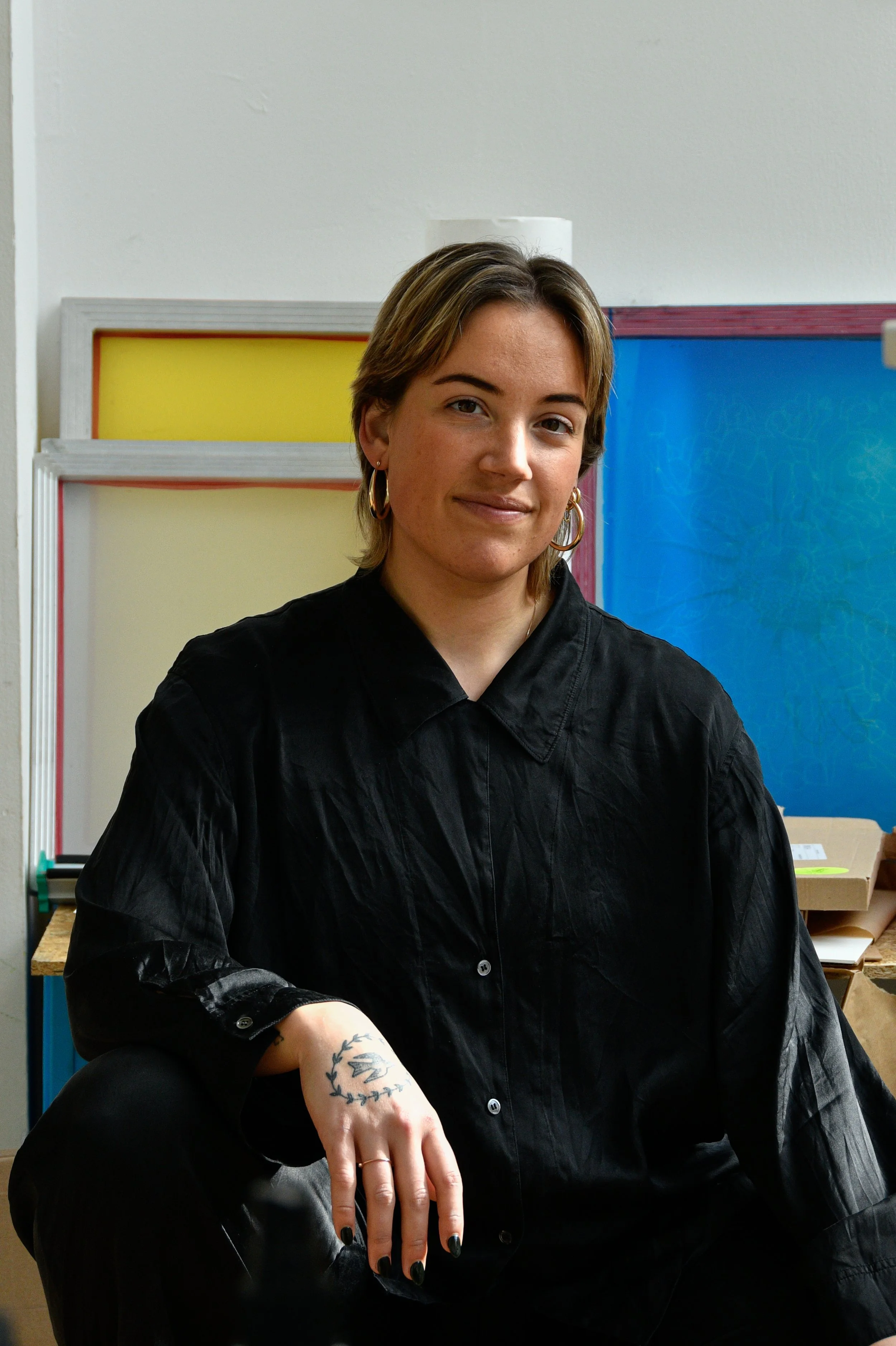10 Questions with Naomi Pérez
Naomi is a design student who is passionate about art and visual communication and uses a deeply human approach. Throughout her career, she has shown a particular interest in topics such as inclusive representation, self-awareness, and cultural exploration. Her projects range from creating graphic elements for public spaces and signage in urban areas to editorial initiatives celebrating diversity, such as recognizing Afro-descendant women in Cali. With a unique sensitivity, Naomi tackles complex concepts like identity, memory, and authenticity, whether through photo books, magazines, or creative research. Her work reflects her commitment to innovation, learning, and making a positive impact on society.
Naomi Pérez - Portrait
ARTIST STATEMENT
Naomi is a designer and visual storyteller driven by her passion for editorial design, photography, analog interventions, and illustration. Her work explores the intersections of identity, memory, and cultural representation, always rooted in a human-centered approach. For Naomi, art serves as a bridge between personal experiences and collective narratives, creating spaces where stories inspire connection and reflection.
Collaboration and continuous learning fuel her creative process as she strives to design work that resonates on both emotional and intellectual levels. Whether crafting sensory narratives, curating editorial content, or blending traditional and digital media, Naomi’s ultimate goal is to foster understanding, empathy, and an appreciation for the stories that shape us.
Ligaduras, photoshop, 3110x2229 px, 2024 © Naomi Pérez
INTERVIEW
Can you tell us a bit about yourself and what inspired you to pursue design?
My name is Naomi, and I am studying graphic design, but I have a passion for all forms of art. This interest also led me to work in the film industry, where I am a boom operator for local short films. I consider myself to have a deeply human perspective on visual communication; everything related to society, empathy, and recognition inspires my work in this graphic world. My interest in design was born from the need to explore creative ways to tell stories, connect with people, and integrate other artistic disciplines.
What drew you to focus on themes like identity, memory, and cultural exploration in your work?
These themes interest me because they reflect what makes us human. My project on the five senses and memory loss, or my initiative to highlight the stories of Afro-descendant women, are examples of how I like to explore the complexity of our experiences, our connections to our roots, and the ways we construct personal and collective identities.
Cover Magazine Essence, Illustrator, 2550x3300 px, 2024 © Naomi Pérez
What types of mediums or formats do you enjoy working with the most, and why?
I enjoy working with editorial design and zine formats because they allow the combination of visual storytelling, poetry, and graphic design in a seemingly "simple" paper medium. I also love creating graphic elements for the music industry, such as posters, album covers, and magazines, as they offer more creative freedom in problem-solving.
How does your passion for inclusive representation influence your creative projects?
Inclusion is at the heart of my work. For instance, in my editorial project on Afro-descendant women, I aim to challenge stereotypes and give visibility to their stories, using design as a tool to foster fair and equitable representation. I always strive to create spaces where everyone can feel seen and where self-awareness is encouraged.
Could you share more about your initiative celebrating Afro-descendant women in Cali? What was the process like?
The project emerged from my interest in highlighting the contributions of Afro-descendant women artists in my city. The process involved researching their representation in the media and working with references like Ebony Deluxe by Laura Campaz and Raíces que nos unen. It was a collaborative effort that included interviews, collecting visual memories, and creating an inclusive editorial design.
Cover Magazine Essence, Illustrator, 2550x3300 px, 2024 © Naomi Pérez
Cover Magazine Essence, Illustrator, 2550x3300 px, 2024 © Naomi Pérez
How do you approach designing graphic elements for public spaces and urban signage? What challenges do you consider?
I draw inspiration from clear concepts, as I did with my classmates using the circulatory system for the wayfinding signage project in Cali's Tequendama neighborhood. Challenges include creating accessible graphics for people with different abilities and ensuring the designs are both functional and aesthetically appealing to diverse audiences, from tourists to local residents.
What role does self-awareness play in your creative process?
Self-awareness is key to keeping my work authentic. In personal and professional projects that often involve visibility and recognition, I reflect on my own emotions and experiences to connect with the narrative. It also helps me identify areas where I can improve, both personally and professionally.
How do you ensure that your work resonates with diverse audiences and remains authentic?
I make an effort to thoroughly research the stories I want to tell and listen to the voices of those directly involved. For instance, in the project about Afro-descendant women, I chose to include personal narratives to ensure the representation was genuine rather than merely interpretative. There's no point in discussing someone else's experience without listening to what they have to say. Empathy and cultural sensitivity are essential in my process.
The Call, Illustration, 3300x5100 px, 2023 © Naomi Pérez
What are some of your favorite projects you've worked on so far, and why do they stand out to you?
One of my favorite projects is a recent one called Ríos Brotan, where I created graphic pieces and a zine for an expanded cinema project. I enjoyed it because it was a meaningful project for a friend, and we creatively aligned on many things, resulting in something satisfying for both of us. It allowed us to fully explore our creative freedom. Another personal project I worked on with close friends aimed to reflect nostalgia through water and body expressiveness. It stands out because of how the idea and creative process emerged, along with the synergy and understanding among us, making the project both enjoyable and fulfilling.
Looking ahead, what kind of impact do you hope your work will have on society and the design field?
I hope my work inspires others to value diversity, embrace the creative process, and use design as a tool for social change. Additionally, I aspire to make an impact in the film industry as a graphic designer, raising awareness about the importance of these elements in every representative setting. I aim to contribute to creative, experimental, and inclusive design.
Artist’s Talk
Al-Tiba9 Interviews is a promotional platform for artists to articulate their vision and engage them with our diverse readership through a published art dialogue. The artists are interviewed by Mohamed Benhadj, the founder & curator of Al-Tiba9, to highlight their artistic careers and introduce them to the international contemporary art scene across our vast network of museums, galleries, art professionals, art dealers, collectors, and art lovers across the globe.




















